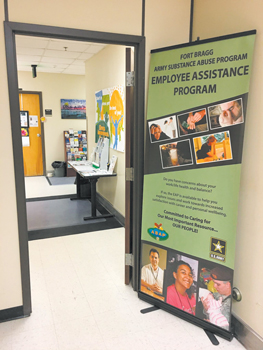 Fort Bragg’s Employee Assistance Program held an event Sept. 25 to educate and inform the community about substance abuse awareness and resources available for treatment.
Fort Bragg’s Employee Assistance Program held an event Sept. 25 to educate and inform the community about substance abuse awareness and resources available for treatment.
The event held at the Soldier Support Center on post was in honor of National Recovery Month. The theme “Join the Voices of Recovery: Celebrating Connections” highlighted two Fort Bragg family members who shared their stories of addiction and sobriety.
“Recovery month gives us the platform to address the total community and Fort Bragg is a big part of that community, to be responsive, our theme this month has to do with community connectedness,” said Lisa Lofton-Berry, Fort Bragg Employee Assistance Program coordinator.
The event allowed people to hear success stories and come away knowing that if they are not satisfied with their level of risk, there are things they can do to make a change, Lofton-Berry said.
The EAP, under the Army Substance Abuse Program, is the branch that focuses on all non-uniform personnel like the Department of Defense civilian employees, military family members, retirees. The goal is to support their work life well-being and mission readiness, Lofton-Berry said.
Military spouse and Alcoholics Anonymous member, Kate (*last name withheld by request), whose alcohol addiction began at the age of 11, said it’s a problem not just in the military but everywhere.
“The most difficult part of my struggle was admitting that I needed help and asking for help,” she said. “I tried to quit several times but was unable to, which surprised me because I am usually able to do anything I want.”
Having struggled with alcoholism for 13 years, she attended her first AA meeting at the age of 24 and is now celebrating 34 years of sobriety.
She said it was much more helpful to talk to people who understood the struggle from personal experience.
“Since I have been sober, I have been very active in AA here in Cumberland County, and the best way to help my sobriety is to help other people,” Kate said.
AA offers in-person meetings, virtual meetings, a hotline, and you can find out more at FayAA.org.
“When I was drinking, I was running from my problems. Because of AA, I can face my problems, walk through them and get to the other side much more easily,” Kate said.
Active-duty family member Jenny Schumacher grew up in a stable, fun-loving house.
Her struggle began following a life-altering deadly car accident in high school, leaving her with a broken pelvis and fractured back, which eventually led to her narcotics addiction later in life.
“That changed the whole turn of everything, the song and the drums that I was dancing to,” she said. “I realized, you know, that I was never going to be a Rockstar, I was not going to be anything that I wanted to be, I was just going to be average, and that was the arrogance of my mind.”
Having moved on with her life, and gotten married, she faced multiple complications during her pregnancies due to her injuries.
Multiple tests, different diagnoses like osteoporosis among others, she was addicted to the drugs to combat her pain.
“Long story short, I wanted to be the mom that can pick her kid up when he's skinned his knee and wanted to be able to run after the other toddler,” Schumacher said.
After losing her marriage and kids, and blowing up her sister's house manufacturing methamphetamine and being sentenced to prison, she chose the path to recovery through a faith-based outlook.
She said every duty station she goes to, the first place she walks into is PWOC — Protestant Women of the Chapel — and she has sisters running up to her.
“If I miss a Tuesday, there's someone there to call me on the phone, and say ‘hey, I didn't see you this Tuesday. Are you sick, do you need some soup, do you need something?’ and vice versa,” Schumacher said.
"We are all there to help each other and hold each other accountable, and I recommend you reach out," she said.
“There are chapel communities out there that are available to help, and it's not just the faith-based community. There are other communities here on post that are here to love on those with substance abuse issues, injury issues, PTSD issues, chronic pain issues,” Schumacher said.
People sharing their story makes all the difference in the world because It’s a personal connection, Lofton-Berry said.
“When you hear real-life stories of how people have experienced challenges and how they have reached out and found ways to turn their lives around in the direction they want, if I'm listening to that, I am like ‘hey if they can do it, I can do it, let me get started today.’” she said.
"We have a weekly class where people know that they can come and get on the path to moving in the direction they'd like to," she said.
“It is a courageous first step, so it is our goal to provide a safe space where people feel comfortable to reach out,” she said. “We manage and invite people to share what's going on and then receive a non-judgmental response.”
Jacqueline Truitt, director of the Addiction Medicine Intensive Outpatient Program at Womack Hospital said she works with soldiers and family members who are in a need of higher-level care to address substance abuse concerns.
“I have patients come and they are in groups five days a week. They get individual counseling as well as other services, (such as) art therapy and meditation to make sure they are ready and really able to integrate with their families and the community,” Truitt said.
"Addiction is a disease, and that’s how we treat it here, and make sure to follow evidence-based practices," she said.
“We want to make sure that people feel confident that when they come in, they receive the help that they need and remove any type of stigma that may be attached with getting help,” Truitt said.
The community can reach them at 910-907-6825; select option 1 to make an appointment and be connected with a licensed clinician.
“This is a huge mission that we have on Fort Bragg. These folks make sacrifices to protect our nation and we want to be there for them,” Lofton-Berry said.
Kate said it is important for people to know they don’t have to struggle. “You can find help with people who understand your problem. We are out there, and we really want to help you.”
“This month is focusing on substance abuse issues, but substance abuse comes from another core issue in our spirit and so if I could say anything, I want to leave people with that message of hope that change does happen,” Schumacher said.
Individuals have an opportunity to explore the level of risk in their lives revolving around substance use by attending weekly classes. They can call 910-396-5784 available Monday through Friday from 8 a.m. to 4 p.m.
Picture: The Fort Bragg Employee Assistance Program office is located in the Soldier Support Center, Bldg. 4-2843 Normandy Drive on Fort Bragg. The EAP offers resources to non-uniformed personnel (DoD civilian employees, military family members and retirees).

 How to resolve AdBlock issue?
How to resolve AdBlock issue? 








